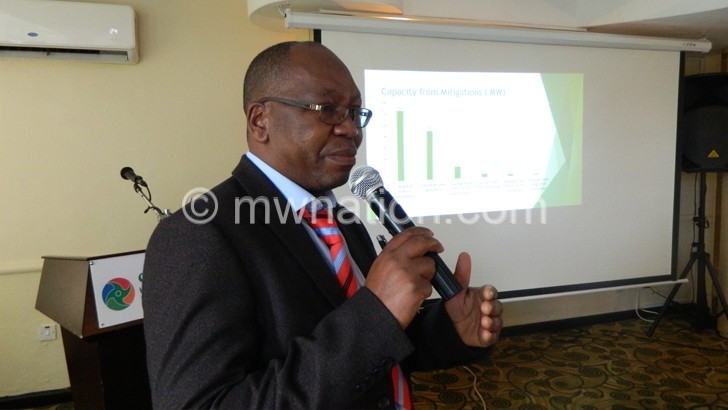Government under fire over energy
Businesses have accused government of talking more and doing little on the ground to resolve the energy supply problem that has now reached crisis levels and threatens to erode economic gains made thus far.
Representatives of businesses and industry expressed their concerns in Blantyre yesterday during a high-level stakeholders’ engagement they held with the Electricity Supply Corporation of Malawi (Escom).
One participant who attended the meeting told The Nation that the business community was incensed by the absence of high-level government representation at the Escom meeting.

journalists yesterday
The participant said the private sector felt that at the level the energy crisis has reached, it was imperative that government, led by President Peter Mutharika, should not leave Escom alone to explain the intervenetions to ease the problem.
Escom said government representatives were invited but did not send any representation.
In recent years, government has been giving Malawians year-around hopes to put an end to persistent power outages that have stifled the pace of economic development.
Escom and Electricity Generation Company (Egenco) have organised a series of stakeholders’ briefings on the power supply situation from July to December 2017.
The meetings come at a time when Escom has also just painted yet another gloomy picture of prolonged load-shedding for the next six months before rains start. Egenco and Escom attribute the reduced generation to low water levels in Lake Malawi and its sole outlet, Shire River, where 95 percent of the country’s hydro-electric power is produced.
Escom also says Malawians will continue experiencing electricity supply deficit for a period of about five years consecutively unless the country receives normal to above normal rainfall.
During the yesterday’s meeting with the business community tempers flared as the audience demanded Escom and Egenco to provide immediate solutions to the crisis and not the usual chants.
The participants said Escom and Egenco were not policy makers and for any recommendation they would still present to government; hence, the need for government delegates to attend the meeting.
Minister of Natural Resources, Energy and Mining Aggrey Masi did not pick up his phone after several attempts while his principal secretary Patrick Matanda was not reachable when contacted on the matter.
However, government spokesperson Nicholas Dausi, who is also Minister of Information and Communications Technology, assured that government was serious to ensuring that electricity challenges are resolved forever.
In an interview last evening, he said: “We will carefully consult Escom and Egenco to see the best approach to end this once and forever. Government will do whatever it can to make sure that we have mitigated the problem of power outages.”
In the 2017/18 financial year, government has allocated about K12.7 billion to the energy sector which Dausi said is aimed at ensuring that there is revolutionary growth in the energy generation, transmission and distribution.
In his State of the Nation Address (Sona) three months ago, President Peter Mutharika indicated energy was a catalyst for socio-economic development as such government had put in place programmes aimed at improving generation, transmission and distribution.
Among them, he cited the completion of feasibility studies for the 300 megawatt Kammwamba Coal-fired Power Plant (to be financed by the Exim Bank of China) and completion of feasibility studies, geotechnical investigations and environmental and social impact assessments on three potential hydropower sites at Fufu, Mpatamanga and Kholombidzo which will add about 700 megawatts to the electricity generation capacity.
And presenting his 2017/18 National Budget Statement, Minister of Finance, Economic Planning and Development Goodall Gondwe said in collaboration with development partners such as the World Bank and African Development Bank (AfDB), government would provide adequate resources to improve the sector.
However, according to Escom commercial and customer service manager Wiseman Kabwazi, the utility company has put in place mitigation measures to reduce the impact of the load-shedding.
Briefing journalists after earlier meeting industry, Kabwazi said as part of the short-term measures, Escom was getting about four megawatts of electricity from Mozambique using the Mangochi and Ntcheu borders and has also already saved about 23 megawatts by using LED bulbs.
“We expect to save another 7.2 megawatts and we have also implemented the energy efficiency measure for the industry which we call the power factor surcharge where we have already saved four megawatts,” he said.
In its July 2017 Monthly Economic Report, Nico Asset Managers mentioned unreliable power supply as one of the key risks to economic development in the country alongside high government debt levels, high lending rates and a weak export base.
Malawi has recently recorded some stability in her economy with inflation rate falling to 11.3 percent as of June 2017, according to the National Statistical Office. The Reserve Bank of Malawi also reduced the policy rate–the bank rate–from 22 percent to 18 percent, triggering reciprocal cuts from commercial banks now pegging their lending rates around 28 percent.
In his 2017/18 National Budget Statement, Minister of Finance, Economic Planning and Development Goodall Gondwe projected economic growth at between five and six percent owing to recovery in the agricultural sector due to improved production and reduced pressure on food prices. n





